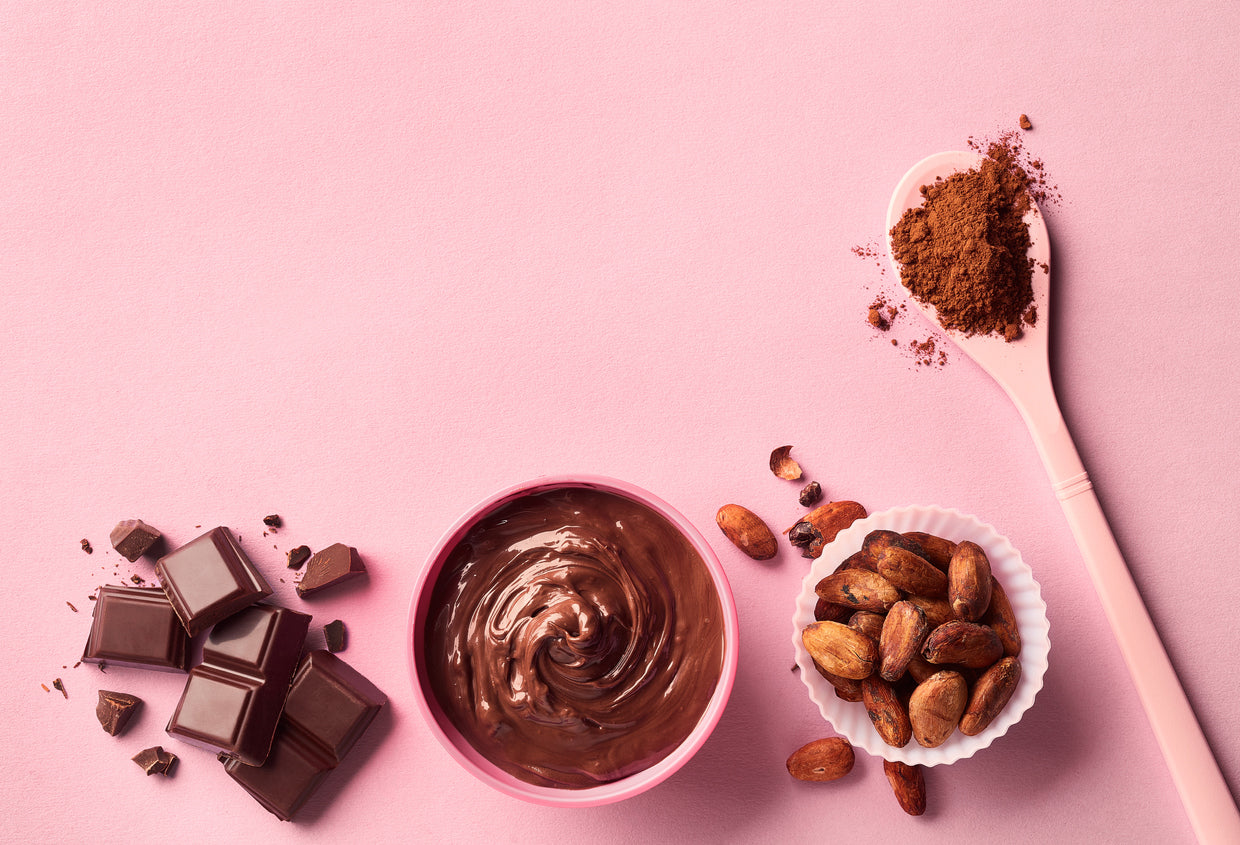
Is Chocolate Good for You? Check Out These Benefits...
Would you believe that people crave chocolate more than any other food in the world? I do! And I’m not surprised. Chocolate is decadent and delicious. But maybe our bodies also know about all the ways in which it can benefit our health. Either way, I’m hooked! So let’s dive in further and explore what chocolate has to offer...
But first, what is in chocolate?
When we’re talking about the health benefits of chocolate, we’re really talking about the properties of cocoa beans–the seeds of the cacao tree. Cocoa beans are first fermented and then roasted and ground into a paste, which is also known as cocoa liquor.
This liquor consists of both cocoa butter and cocoa solids. Cocoa butter is mostly fat. And the solids, used to make cocoa powder, contain minerals, fiber, and a ton of antioxidants. In general, chocolate bars and the like are made by mixing cocoa liquor with cocoa butter and some form of sweetener. And the percentage of cocoa liquor used is what determines how “dark” the chocolate is.
Is white chocolate good for you?
White chocolate contains only cocoa butter (at least 20%) mixed with sugar and dairy. So there’s very little nutrition, if any at all.
The higher the percentage of cocoa solids, the more nutrients the chocolate contains. And the less sugar and other stuff. This is why dark chocolate is considered the healthiest chocolate as it has a minimum of 35% cocoa liquor. Right in the middle of the pack, milk chocolate contains only 10-12% cocoa. It has less nutrients and more sugar while also containing condensed or powdered milk.
Cocoa powder is used to flavor many foods and beverages. However, how the cocoa powder is processed is important. Natural, unsweetened cocoa powder is best. And what you’ll find in my protein powders and collagen shakes.
On the other hand, alkalized cocoa powder (a.k.a. Dutch processed) is chemically treated to alter its pH for certain culinary purposes. Essentially, it changes the color and makes it less bitter. However, the alkalizing process also diminishes the powder’s nutritional profile.
What are the nutritional benefits of cocoa powder?

We can learn a lot about the health benefits of cocoa from the Kuna Indians, an indigenous tribe of people from the islands of Panama. The Kuna enjoy a traditional cocoa beverage regularly, averaging 30 ounces a day. And this population has a low prevalence of heart disease, high blood pressure, type 2 diabetes, stroke, and cancer. Interestingly, Kuna who migrate to the main island of Panama and eat a less traditional diet (including less cocoa) show an increased prevalence of these Western diseases.
We can thank cocoa’s impressive cocktail of nutrients for its health benefits. Here’s a more detailed look at the nutrient profile of cocoa:
Fat content in cocoa powder
A healthy mix of saturated and monounsaturated fats. In fact, cocoa butter is high in oleic acid–the same predominant fatty acid found in olive oil
High fiber cocoa powder
You’ll find approximately 2 grams of fiber in every tablespoon of natural, unsweetened cocoa powder. This is just one of the many reasons why it’s a great addition to protein shakes and smoothies.
What minerals are in cocoa powder?
Cocoa is a great source of magnesium, which deficiencies are common due to processed foods diets and constant stress. It also contains a good concentration of copper, iron, and manganese. And modest amounts of calcium, potassium, phosphorous, zinc, and selenium.
Cocoa antioxidants
Cocoa is rich in antioxidant compounds known as flavonoids, which are what gives it a bitter flavor. And cocoa has substantially more antioxidants than most other common plant-based foods.
Why are cocoa antioxidants so important?
Antioxidants protect your cells and other internal structures, including your DNA, from a never ending barrage of harmful free radicals. Compounds our bodies produce naturally, but are also derived from external sources, such as pesticides, processed foods, pollution, plastic chemicals, and more. Further, the flavonoids (the predominant antioxidants) in cocoa solids have been shown to exhibit many other specific health promoting properties. Let’s take a closer look…
Benefit of dark chocolate for skin with cocoa antioxidants
Protect your skin from UV radiation with regular consumption of dark chocolate (with a high concentration of cocoa). It has been shown to offer skin photoprotective effects.
How does cocoa antioxidants boost brain power?
Flavonoids in cocoa have been shown to improve cognitive function (i.e., thinking, focus, memory, etc.) as well as protect the brain from degenerative diseases, such as Alzheimer’s and Parkinson’s.
Using cocoa antioxidants to protect your heart
Studies have associated cocoa consumption with significantly lower mortality rates from heart disease. In addition, flavonoids can play a role in decreasing your risk of cardiovascular complications by fighting inflammation and preventing oxidation (damage caused by free radicals). Because we now know that inflammation and oxidative stress play a significant role in the development of heart disease.
Lower your blood pressure by consuming cocoa antioxidants
Numerous studies have demonstrated that the intake of flavonoid rich cocoa foods and beverages can successfully lower blood pressure in those with hypertension. In addition, cocoa has been shown to improve the vascular (blood vessel) functioning.
Enhance your insulin sensitivity with cocoa antioxidants
There is scientific evidence suggesting that the antioxidants in cocoa may boost insulin sensitivity by means of improving vascular function, lowering oxidative stress, and enhancing your body’s ability to metabolize glucose.
Is dark chocolate good for weight loss?
If you’ve got extra pounds to lose, there’s a good chance your body is inflamed. And this inflammation must be addressed to successfully lose weight and keep it off. Therefore, when consumed responsibly–which I’ll get into in a bit–chocolate can actually help reduce inflammation and aid your weight loss efforts. In addition, while chocolate is often thought of as a splurge, studies have found no link between weight gain and cocoa or dark chocolate consumption in small amounts.
Further, participants in this study that consumed dark chocolate (70% cocoa) experienced higher satiety and less cravings for sweet foods than those that consumed milk chocolate (30% cocoa). The dark chocolate group also consumed less food during their next meal. So...we can all have our cake, I mean chocolate, and eat it too! But, the key word is moderation. Too much chocolate as well as the wrong type of chocolate can be a bad thing.
What makes a healthy chocolate?
Bitter dark chocolate is better for weight loss
As I mentioned earlier, flavonoids give chocolate its bitter taste. This means the more bitter the chocolate, the higher concentration of antioxidants. So, while dark chocolate may be an acquired taste, I say it’s worth acquiring.
Quality dark chocolate over quantity for weight loss
Stick to dark chocolate with a high cocoa percentage (70% or more). Or natural, unsweetened cocoa powder. And aim to eat no more than 2 ounces a day.
Consider timing of dark chocolate
Certain compounds in cocoa, such as theobromine and caffeine, may be stimulating for some. Therefore, if you’re sensitive to these effects, chocolate may be best eaten earlier in the day.
The final word on health benefits in chocolate
Mainly due to its high concentration of antioxidants, chocolate has many health benefits to offer. So go ahead and indulge, guilt free. But remember to keep it dark and in small quantities.
Keep thinking Big and living BOLD!

REFERENCES Chocolate/cocoa and human health: a review Eating chocolate can significantly protect the skin from UV light The neuroprotective effects of cocoa flavanol and its influence on cognitive performance Cocoa and Chocolate in Human Health and Disease Eating dark and milk chocolate








